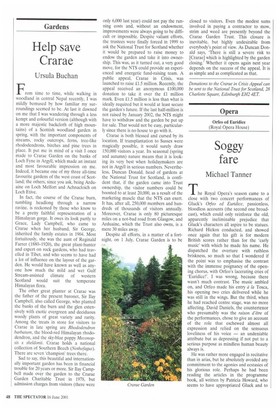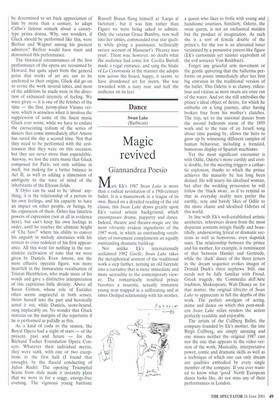Orfeo ed Euridice (Royal Opera House)
Soggy fare
Michael Tanner
The Royal Opera's season came to a close with two concert performances of Gluck's Orfeo ed Euridice, passionless, bloodless accounts (the second one broadcast), which could only reinforce the old, apparently ineliminable prejudice that Gluck's characters all aspire to be statues. Richard Hickox conducted, and showed once again that his gift is for modern British scores rather than for the 'early music' with which he made his name. He dispatched the overture with ruthless briskness, so much so that I wondered if the point was to emphasise the contrast with the immense poignancy of the opening chorus, with Orfeo's lacerating cries of 'Euridice!'. I was wrong, because there wasn't much contrast. The music ambled on, and Orfeo made his entry a la Tosca, his opening two cries delivered while he was still in the wings. But the third, when he had reached centre stage, was no more affecting. David Daniels, the countertenor who presumably was the raison d'être of the performances, chose to give an account of the role that eschewed almost all expression and relied on the sensuous loveliness of his voice — an undeniable attribute but as depressing if not put to a serious purpose as mindless human beauty always is.
He was rather more engaged in recitative than in arias, but he absolutely avoided any commitment to the agonies and ecstasies of his glorious role. Perhaps he had been reading the articles in the programme book, all written by Patricia Howard, who seems to have appropriated Gluck and to be determined to set back appreciation of him by more than a century, to adapt Callas's famous remark about a canarytype prima donna. Why, one wonders, if Gluck should be performed like this, were Berlioz and Wagner among his greatest admirers? Berlioz would have risen and denounced this performance.
The historical circumstances of the first performance of the opera are recounted by Howard, but quite apart from the general point that works of art are not to be anchored to their origins, Gluck did go on to revise the work several times, and most of the additions he made were in the direction of enhanced intensity of feeling. We were given — it is one of the fetishes of the time — the first, penny-plain Vienna version, which is senseless when it involves the suppression of some of the finest music Gluck ever wrote, while we have to endure the excruciating tedium of the series of dances that come immediately after Amore has saved the day a second time. Not that they need to be performed with the zestlessness that they were on this occasion, but they are never more than expendable. Anyway, we lost the extra music that Gluck composed for Paris, not only sublime in itself, but making for a better balance in Act II, as well as adding a dimension of ambiguity to the state of mind of the inhabitants of the Elysian fields.
If Orfeo can be said to be 'about' anything, it is the relationship of a person to his own feelings, and his capacity to have an impact on other people, or beings, by his expression of them. Orfeo has limitless powers of expression (not at all in evidence here), but can't keep his own feelings in order, until he reaches the ultimate height of `Che faro?' where his ability to convey his anguish in melody alternates with his retreat to cries redolent of his first appearance. All this went for nothing in the narcissistic cultivation of tone that we were given by Daniels. Even Amore, not the most effusive operatic figure, was more heartfelt in the immaculate vocalisation of Tristan Harnbleton, who made more of his words and gave a distinctive interpretation of this capricious little divinity. Above all Susan Gritton, whose role of Euridice often seems ungrateful in both senses, threw herself into the part and heroically acted it out. while Daniels, score-bound, sang implacably on. No wonder that Gluck remains on the margins of the repertoire if he is performed as pallidly as this.
As a kind of coda to the season, the Royal Opera had a night of stars — of the present, past and future — for the Richard Tucker Foundation Opera Concert. Whatever their individual merits, they were sunk, with one or two exceptions in the first half (I found that enough), by the flaccid conducting of Julius Rudel. The opening Triumphal Scene from Aida made it instantly plain that we were in for a soggy, energy-free evening. The vigorous young baritone Russell Braun flung himself at 'Largo al factotum', but it was him rather than Figaro we were being asked to admire. Only the veteran Grace Bumbry, now well into her sixties, commanded true star quality while giving a passionate, technically secure account of Massenet's Tleurez mes yeux'. There was, however, no doubt what the audience had come for. Cecilia Bartoli made a regal entrance, and sang the finale of La Cenerentola in the manner she adopts now across the board, happy, it seems, to have abandoned art for stunts. She was rewarded with a lusty roar and half the audience on its feet.



































































 Previous page
Previous page